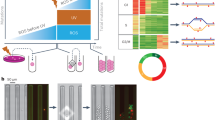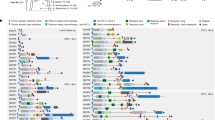Abstract
The p16INK4a (α and β form) and p15INK4b genes were analysed for homozygous deletion, hypermethylation and point mutation in B6C3F1 mouse lymphomas induced by 2′,3′-dideoxycytidine or 1,3-butadiene. Although the p16INK4a-α gene appeared normal in DNA from 2′,3′-dideoxycytidine-induced lymphomas, Southern analyses revealed homozygous deletions or rearrangements of the p16INK4aβ and/or p15INK4b genes in four of 16 tumours. Surprisingly, two of these lymphomas showed exclusive deletions of the p16INK4a EIβ exon. The p15INK4b promoter region was hypermethylated in two additional 2′,3′-dideoxycytidine-induced lymphomas. In contrast, homozygous deletions spanning the p16INK4a and p15INK4b loci were observed in only two of 31 1,3-butadiene-induced tumours. Thus, these cyclin dependent kinase inhibitor genes may play a significant role in chemically induced mouse lymphomas and support the contention of tumour suppressor activity for the p19ARF protein encoded by the p16INK4a-β gene. Different genetic pathways may be involved in the development of these chemically induced tumours since we have previously shown that mutations in p53 and ras genes are common in 1,3-butadiene- but not 2′,3′-dideoxycytidine-induced lymphomas.
This is a preview of subscription content, access via your institution
Access options
Subscribe to this journal
Receive 50 print issues and online access
$259.00 per year
only $5.18 per issue
Buy this article
- Purchase on Springer Link
- Instant access to full article PDF
Prices may be subject to local taxes which are calculated during checkout
Similar content being viewed by others
Author information
Authors and Affiliations
Rights and permissions
About this article
Cite this article
Zhuang, SM., Schippert, Å., Haugen-Strano, A. et al. Inactivations of p16INK4a-α, p16INK4a-β and p15INK4b genes in 2′, 3′-dideoxycytidine- and 1,3-butadiene-induced murine lymphomas. Oncogene 16, 803–808 (1998). https://doi.org/10.1038/sj.onc.1201600
Received:
Revised:
Accepted:
Published:
Issue Date:
DOI: https://doi.org/10.1038/sj.onc.1201600
Keywords
This article is cited by
-
Environmental pollution and DNA methylation: carcinogenesis, clinical significance, and practical applications
Frontiers of Medicine (2015)
-
Genomic alterations in spontaneous and carcinogen-induced murine melanoma cell lines
Oncogene (2004)
-
Germline mutations of the INK4a-ARF gene in patients with suspected genetic predisposition to melanoma
British Journal of Cancer (2004)
-
Concurrent disruption of p16INK4a and the ARF-p53 pathway predicts poor prognosis in aggressive non-Hodgkin's lymphoma
Leukemia (2000)
-
An Eμ-BCL-2 transgene facilitates leukaemogenesis by ionizing radiation
Oncogene (1999)



